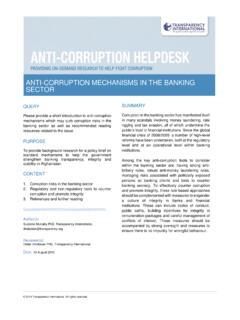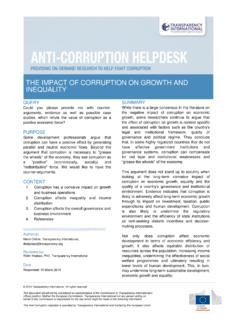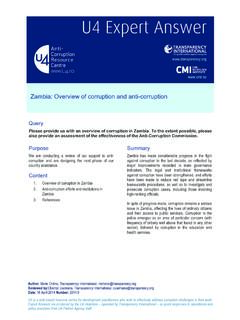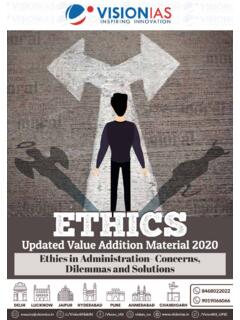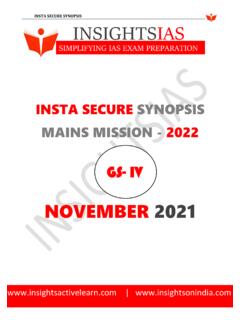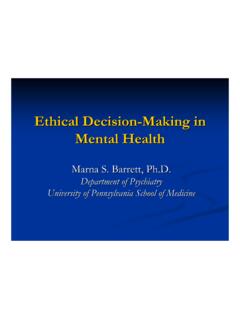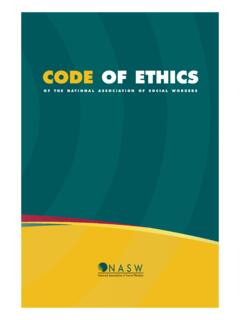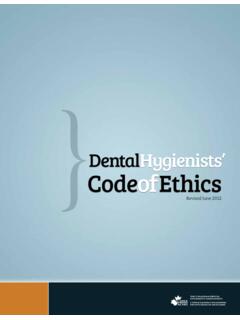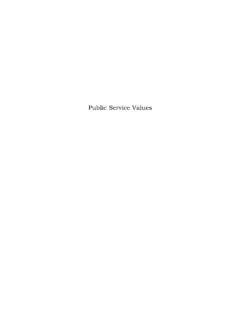Transcription of CONFLICT OF INTEREST IN PUBLIC PROCUREMENT
1 2013 Transparency International. All rights reserved. This document should not be considered as representative of the Commission or Transparency International s official position. Neither the European Commission, Transparency International nor any person acting on behalf of the Commission is responsible for the use which might be made of the following information. This anti-corruption Helpdesk is operated by Transparency International and funded by the European Union CONFLICT OF INTEREST IN PUBLIC PROCUREMENT QUERY How can we avoid CONFLICT of INTEREST in PUBLIC PROCUREMENT and make sure that members of the evaluation committee are neither shareholders of one of the bidding companies nor related or affiliated to some members?
2 CONTENT 1. PUBLIC PROCUREMENT and corruption 2. Avoiding CONFLICT of INTEREST in PUBLIC PROCUREMENT processes 3. References \\\\\\\\\\\\\\\\\\\\\\\\\\\\\\\\\\\\\\\\ \\\\\\\\\\\\\\\\\\\\\\\\\\\\\\\\\\\\\\ Author(s) Ma ra Martini, Transparency International, Reviewer(s) Marie Ch ne,Transparency International; Robin Hodess, , Transparency International Date Submitted: 17 January 2013 Responded: 28 January 2013 SUMMARY CONFLICT of INTEREST may arise at various stages of the PROCUREMENT process whenever PUBLIC officials decisions can be influenced by their private interests. The evaluation and award of bids is often assessed as one of the most vulnerable phases, due to the high level of technical expertise required and the specific features of evaluation committees. Therefore, in order to prevent and avoid CONFLICT of INTEREST in PUBLIC PROCUREMENT , countries should enact guidelines with a clear definition of CONFLICT of INTEREST , as well as put forth requirements for officials involved in the PROCUREMENT process to disclose information on their private interests and assets, in addition to excusing themselves from certain decision-making processes and prohibiting them from performing certain functions if the opportunities for CONFLICT of INTEREST exist.
3 In addition, access to information, stakeholder participation in key stages of the PROCUREMENT cycle and clear review mechanisms are essential to transparency and accountability in PUBLIC PROCUREMENT , and therefore, are essential in preventing CONFLICT of INTEREST and other forms of corruption. Moreover, effective implementation and enforcement of the law are key to create a deterrent effect and ensure integrity during the process. CONFLICT OF INTEREST IN PUBLIC PROCUREMENT 2 1 PUBLIC PROCUREMENT AND CORRUPTION Overview PROCUREMENT is one of the government sectors most vulnerable to corruption, due to the large amounts of funds and the high levels of discretion and bureaucracy often involved in such processes that provide both incentives and opportunities for rent-seeking behaviours (Transparencia Mexicana 2012). Corruption in PROCUREMENT directly affects citizens access to basic services, such as education, health and infrastructure.
4 Corruption in PROCUREMENT can take many forms (for example, bribery, facilitation payments, CONFLICT of INTEREST and bid-rigging) and can occur at all stages of the PROCUREMENT cycle from the decision to contract, the specifications of the contract, the tendering process, evaluation and award to the contract implementation and final accounting. Yet, corruption risks are especially hard to detect because of the size, number and complexity of the transactions involved that often require high levels of technical expertise at all stages of the process (Transparency International 2010). CONFLICT of INTEREST in PUBLIC PROCUREMENT processes CONFLICT of INTEREST is defined as a situation in which a PUBLIC official has a private or other INTEREST which is such as to influence, or appear to influence, the impartial and objective performance of his or her official duties (Reed 2008).
5 If not adequately identified and managed, these CONFLICT of INTEREST situations provide opportunities for PUBLIC officials to take advantage of their PUBLIC position for their personal benefit (OECD 2005). In PUBLIC PROCUREMENT , CONFLICT of INTEREST may arise in various stages of the PROCUREMENT process whenever PUBLIC officials decisions or actions are influenced by their private interests. For example, impartiality can be hampered if one of the PROCUREMENT officers responsible for deciding which company will be awarded the contract has an economic INTEREST in one of the bidding companies, or if any of his relatives or close friends are the owners of one of these companies (Heggstad et al. 2010). CONFLICT of INTEREST may also arise if PROCUREMENT officers are offered future employment (post- PUBLIC employment) in one of the bidding companies.
6 The bid evaluation and contract award are frequently assessed as the most vulnerable phases of the PROCUREMENT process due to the high level of expertise required and the specific features of awarding and monitoring committees. Members of the evaluation committee may use their discretionary power, as well as their access to confidential information, to give preferential treatment to one of the bidders in accordance with their own private interests. In such circumstances where PUBLIC decision-making is biased, there is no guarantee that contracts are awarded in the PUBLIC INTEREST , that the government is benefiting from the best competitive offer and that value for money is being achieved (Arrowsmith et al. 2010). In addition, recurrent instances of impartial and unfair PROCUREMENT processes can lead to PUBLIC dissatisfaction and low trust in government institutions.
7 2 AVOIDING CONFLICT OF INTEREST IN PUBLIC PROCUREMENT PROCESSES How to regulate There are a number of legal instruments available for countries aimed at preventing and avoiding CONFLICT of INTEREST in PUBLIC PROCUREMENT . Countries may opt for addressing the issue by adopting legislation dealing specifically with the issue of CONFLICT of INTEREST , or by regulating integrity in PUBLIC PROCUREMENT in general. Requirements for declaration of INTEREST may also be an efficient way of preventing CONFLICT of interests. Similarly, codes of conduct may offer guidance on the main ethical issues faced during PROCUREMENT processes. What to regulate Good practice in CONFLICT of INTEREST regulation typically includes a clear definition of CONFLICT of INTEREST , a clear process of how CONFLICT of INTEREST will be managed, publication of a register of INTEREST of decision-makers (including past interests and positions to be updated regularly), as well as CONFLICT OF INTEREST IN PUBLIC PROCUREMENT 3 provisions for trainings on integrity issues.
8 Therefore, in order to prevent and avoid CONFLICT of INTEREST in PUBLIC PROCUREMENT , three main issues should be regulated: functions and positions to be held by PROCUREMENT officials; registration of INTEREST ; and steps to be taken when a CONFLICT of INTEREST is identified (Heggstadt 2010; Transparency International 2006). 1. PUBLIC PROCUREMENT officials or members of the evaluation committee should be prohibited to perform certain functions and/or hold certain positions. In this case, CONFLICT of INTEREST legislation with regard to PROCUREMENT is generally established through civil service legislation, CONFLICT of INTEREST legislation, codes of conduct, or PROCUREMENT regulations or acts. Provisions may forbid officials and members of the evaluation committee to hold ownership stakes in companies doing business with the government; to accept, for a certain period of time after leaving PUBLIC office, a position in companies with which the government did business; to hold another position in a different branch of the government; or to hold a position in a statutory organ of a private entity.
9 CONFLICT of INTEREST laws In Spain, the Law on CONFLICT of INTEREST of April 2006 deals specifically with CONFLICT of INTEREST in PUBLIC PROCUREMENT processes. According to the law, PROCUREMENT officials are not allowed to accumulate any other position, and high-ranking officials have to abstain from participating in the evaluation or award of contracts for companies that they or their families managed or represented in the two years prior to their appointment in PUBLIC office. In addition to the law on CONFLICT of INTEREST , the Spanish law on PUBLIC Sector Contracts of 2006 also provides for regulations on CONFLICT of INTEREST . For instance, officials in charge of PROCUREMENT are prohibited from intervening in PROCUREMENT procedures when they have an INTEREST in the bidding company. In more general terms, the law established that companies are forbidden to contract with the PUBLIC administration when any high-ranking PUBLIC official or members of the government have investments in over 10 per cent of their capital (OECD 2007).
10 In other countries, such as Egypt, Israel, Turkey and the United States, PROCUREMENT officials are not allowed to undertake any other paid position while holding PUBLIC office (OECD 2010). However, where the salaries of PUBLIC officials are too low, it is unrealistic to have regulations prohibiting officials from having an external source of income. In these cases, officials should be allowed to hold position in other legal entities, but they should be excluded from PROCUREMENT processes that could generate a real, potential or apparent CONFLICT of INTEREST . For instance, in Kenya, civil servants are not prohibited from owning shares or holding a position in a company, unless such sources of income could result in the PUBLIC official s personal interests conflicting with his or her official duties (Reed 2008). In order to guarantee impartiality throughout the PROCUREMENT process, many countries provide rules to deal with situations that may occur inside contracting entities, such as the composition of a tender evaluation committee or a potential CONFLICT of INTEREST (OECD 2010).

